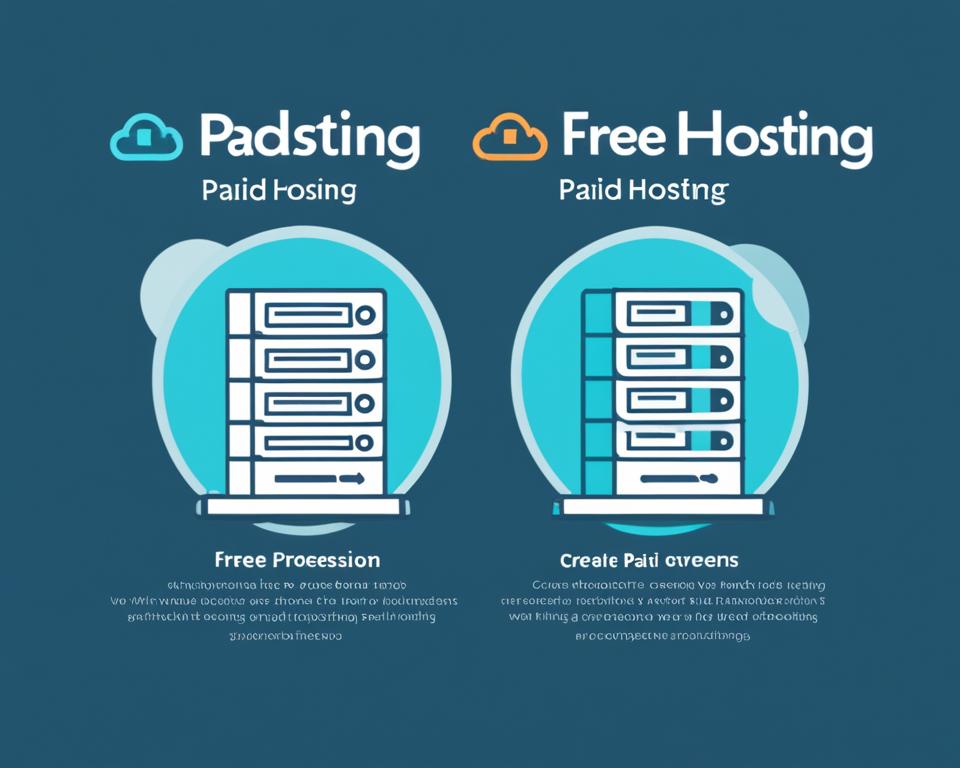Welcome to the world of web hosting! If you’re new to website ownership, you may have come across the term “web hosting provider” and wondered what it means. In simple terms, a web hosting provider is a company that offers services to store and maintain your website files on a server, making your website accessible to users on the internet.
When you create a website, you need a place to store all the files that make up your site, such as HTML, CSS, images, and videos. This is where a web hosting provider comes in. They provide the necessary infrastructure and technology to keep your website up and running.
Web hosting companies like GoDaddy, Bluehost, and HostGator offer a range of web hosting services to suit different needs. Whether you’re a small business owner, a blogger, or an e-commerce entrepreneur, there’s a web hosting company out there that can meet your requirements.
Key Takeaways:
- Web hosting providers offer services to store and maintain your website files on a server.
- They make your website accessible to users on the internet.
- Popular web hosting companies include GoDaddy, Bluehost, and HostGator.
- Choosing the right web hosting provider is crucial for the success of your website.
- The services provided by web hosting companies vary, so it’s important to assess your specific needs and choose accordingly.
How Does Web Hosting Work?
Web hosting is the backbone of every website, allowing it to exist and be accessible to users around the world. But how does web hosting actually work? Let’s delve into the process and understand the intricate workings behind it.
At its core, web hosting involves storing website files and applications on a server. Think of the server as a powerful computer that runs 24/7, specifically designed to host websites and make them accessible on the internet. When a visitor enters your website’s URL into their browser, the browser sends a request to the hosting server, initiating a connection.
The hosting server then retrieves the necessary files and data from its storage and sends them back to the visitor’s browser. This seamless transfer happens in a matter of milliseconds, allowing the website to load and appear on the user’s screen.
The server itself is provided by a web hosting company, such as Namecheap or DreamHost, who are experts in managing and maintaining these powerful machines. These companies offer various hosting plans, each with its own allocation of server resources, including bandwidth, RAM, and disk space. The hosting provider takes care of keeping the server powered on and connected to the internet, ensuring that your website remains accessible at all times.
Web hosting not only enables website accessibility but also plays a crucial role in ensuring website performance and security. Hosting providers employ various technologies and security measures to protect websites from cyber threats and unauthorized access. They regularly update server software, monitor server health, and provide technical support to address any issues that may arise.
Now, let’s take a closer look at the process through a simplified step-by-step journey:
- A user enters your website’s URL into their browser.
- The browser sends a request to the hosting server.
- The hosting server retrieves the necessary files from its storage.
- The server sends the files back to the user’s browser.
- The browser renders the files, and your website appears on the user’s screen.
Visualizing Web Hosting
To help you visualize the concept of web hosting, take a look at the diagram below:
Benefits of Web Hosting
Web hosting offers numerous benefits for website owners:
Accessibility: Web hosting ensures that your website is available to users anytime, anywhere.
Reliability: Hosting providers have redundant systems in place to prevent downtime and keep your website running smoothly.
Scalability: As your website grows, you can easily upgrade your hosting plan to accommodate increased traffic and resource demands.
Security: Hosting companies employ robust security measures to safeguard your website and protect it from cyber threats.
Support: If you encounter any issues or have questions, hosting providers offer technical support to help you resolve them.
Understanding how web hosting works provides website owners with the knowledge to make informed decisions when choosing a hosting provider. It allows you to assess the server resources you require, select a reliable hosting company, and ensure that your website remains accessible and performs optimally.
Types of Web Hosting
When it comes to web hosting, there are various options available to suit different website needs. Let’s explore the different types of web hosting:
- Shared Hosting: This is the most common and cost-effective type of hosting. With shared hosting, multiple websites are hosted on the same server, sharing its resources. It is a great option for small websites or beginners with limited traffic.
- Virtual Private Servers (VPS): VPS hosting offers more control and resources compared to shared hosting. It works by partitioning a physical server into multiple virtual servers, providing dedicated resources to each website. VPS hosting provides a balance between affordability and performance for medium-sized websites.
- Dedicated Hosting: Dedicated hosting offers maximum control and resources as you have an entire server dedicated to your website. It is ideal for large businesses or high-traffic websites that require optimal performance, security, and customization options.
- Managed Hosting: Managed hosting allows website owners to focus on their content while leaving server management to the hosting provider. The hosting provider takes care of routine maintenance tasks, security updates, and technical support, making it a convenient option for non-technical website owners.
- Cloud Hosting: Cloud hosting utilizes multiple interconnected servers to host websites. It offers scalability, flexibility, and reliability as resources can be dynamically allocated based on website needs. Cloud hosting is suitable for websites that experience fluctuating traffic or require high levels of reliability and uptime.
No matter the type of web hosting you choose, it’s crucial to select a reputable and reliable hosting provider that meets your specific website requirements.
The image above visually represents the different types of web hosting options available.
Best Web Hosting Services
When it comes to choosing the best web hosting services for your website, there are several reputable providers that offer a combination of pricing, features, and customization options. Here are some of the top web hosting providers:
- Namecheap: Namecheap is known for its affordable hosting plans and excellent customer support. It offers shared hosting, VPS hosting, and dedicated hosting options. With Namecheap, you can expect reliable performance and a user-friendly interface.
- DreamHost: DreamHost is a popular choice for website owners looking for a reliable and feature-rich hosting provider. It offers a variety of hosting plans, including shared hosting, VPS hosting, and dedicated hosting. DreamHost also provides excellent uptime and fast loading speeds.
- HostGator: HostGator is known for its flexible hosting plans that cater to both small businesses and large enterprises. It offers shared hosting, VPS hosting, and dedicated hosting options. HostGator also provides a user-friendly control panel and 24/7 customer support.
- Hostwinds: Hostwinds is a reliable hosting provider that offers a range of hosting solutions, including shared hosting, VPS hosting, and dedicated hosting. It provides SSD storage, free website migration, and a 99.9% uptime guarantee.
These web hosting services offer a combination of reliability, performance, and customer support to ensure that your website remains accessible and performs optimally. Consider your specific website needs and choose the hosting provider that best aligns with your requirements.
Choose the Right Web Hosting Provider for Your Website
When selecting a web hosting provider, it’s essential to consider factors such as:
- The specific requirements of your website.
- The bandwidth allowance provided by the hosting provider.
- The availability of upgrade options as your website grows.
- The uptime history of the hosting provider.
- The refund policy in case you are not satisfied with the service.
Taking these factors into account will help you make an informed decision and choose the best web hosting service for your website. Remember, the right hosting provider plays a crucial role in the success of your online presence.
Getting Started with Website Creation
So, you’ve decided to create your own website? Congratulations! It’s an exciting journey that can help you establish your online presence and reach a wider audience. To get started, you’ll need to follow a few essential steps:
- Domain Registration: The first step is to choose and register a domain name for your website. This is the address where users will find your site on the internet. Choose a name that represents your brand or website’s purpose and check its availability. Domain registrars like Namecheap or GoDaddy can help you with this process.
- Nameservers: Once you’ve registered your domain, you’ll need to set up nameservers. Nameservers are like phone books for the internet, linking your domain name to the server where your website files are stored. Your web hosting provider will provide you with the necessary nameserver information.
- Web Hosting: Now that you have your domain registered and nameservers set up, it’s time to choose a web hosting provider. Web hosting companies like DreamHost or HostGator offer server space where you can store your website files and make them accessible to users. Consider factors such as storage, bandwidth, and technical support when selecting a hosting provider.
With these steps completed, you’re well on your way to creating your own website. Next, you’ll need to design and build your site, upload your content, and optimize it for search engines. Remember to prioritize user experience and create engaging, informative content. Good luck!

A visual representation of the steps involved in getting started with website creation.
Benefits of Web Hosting
Web hosting provides numerous benefits to website owners, ensuring the smooth and successful operation of their online presence. Let’s explore some of the key advantages offered by web hosting:
1. Accessibility
By utilizing web hosting services, your website becomes accessible to users worldwide. Hosting providers ensure that your website files are stored on high-performance servers connected to the internet, allowing visitors to access your site at any time.
2. Security
Web hosting companies prioritize the security of your website. They implement robust security measures and employ technologies to protect your site from cyber threats, such as malware and hacking attempts. Regular backups and security updates are also typically included.
3. Maintenance
With web hosting, you can rely on the hosting provider to handle server maintenance tasks. This includes keeping servers updated, optimizing performance, and resolving any technical issues that may arise. This allows you to focus on managing your website content and growing your online business.
4. Technical Support
Web hosting services often come with reliable technical support. Hosting providers have knowledgeable and experienced support teams available to assist you with any questions or concerns you may have regarding your hosting account or website functionality.
“Web hosting providers take the burden of managing server infrastructure and security off your shoulders, allowing you to focus on what matters most – creating and delivering valuable content to your audience.”
5. Scalability
Many web hosting plans offer scalability options, allowing you to easily adjust your resources based on your website’s needs. As your site grows, you can upgrade your hosting plan to accommodate higher traffic volumes and resource requirements.
6. Cost-Effectiveness
Web hosting is generally cost-effective, especially when compared to the expenses associated with setting up and maintaining your own server infrastructure. By outsourcing hosting to a reliable provider, you can access professional-grade infrastructure and services within your budget.
| Benefits | Description |
|---|---|
| Accessibility | Ensures your website is available to users worldwide. |
| Security | Provides robust protection against cyber threats. |
| Maintenance | Handles server maintenance and technical issues. |
| Technical Support | Offers reliable assistance from knowledgeable support teams. |
| Scalability | Enables easy resource adjustments as your site grows. |
| Cost-Effectiveness | Provides professional-grade services within your budget. |
Web Hosting vs. Domain Name
When it comes to publishing a website, both web hosting and domain names play crucial roles. However, they serve different functions and are essential components in establishing an online presence. Let’s dive deeper into understanding the differences between web hosting and domain names.
Web Hosting
Web hosting involves the storage and maintenance of website files on a server. It is responsible for ensuring that your website is accessible to users on the internet. Website files, including HTML, CSS, images, and videos, are securely stored on a web hosting server.
When a user enters your website’s domain name into their browser, the web hosting provider transfers the website files from the server to the user’s browser, allowing them to access and view your website.
Domain Name
A domain name is the unique address that users enter into their browsers to access your website. It acts as the online identity for your website.
Domain names are registered with domain registrars, such as GoDaddy or Namecheap. They consist of two parts: the specific name, chosen by the website owner, and the top-level domain (TLD) like .com, .net, or .org.
For example, in the domain name “www.mywebsite.com,” “www” is the specific name, and “.com” is the TLD.
Domain names provide an easy and memorable way for users to find and access your website. They serve as an address that directs visitors to the web hosting server where your website files are stored.
Web Hosting and Domain Names
While web hosting and domain names are distinct concepts, they work together to make your website accessible on the internet. Websites can be hosted by the same company that serves as the domain registrar or different providers.
Here’s a simplified diagram to illustrate the relationship between web hosting and domain names:
| Component | Description |
|---|---|
| Web Hosting | Stores and maintains website files on a server |
| Domain Name | Serves as the website’s address that users enter into their browsers |
| User’s Browser | Requests website files from the web hosting server using the domain name |
When a user enters your domain name into their browser, it triggers a series of interactions that result in the display of your website. The user’s browser sends a request to the web hosting server, which transfers the required website files back to the browser, allowing the website to be accessed and rendered.
It’s essential to choose reliable web hosting and domain name providers to ensure the accessibility and smooth functioning of your website.
In summary, web hosting and domain names are integral parts of website publishing. Web hosting involves storing and maintaining website files, while domain names serve as the address that directs users to your website. Together, they work harmoniously to make your website accessible to users on the internet.
Factors to Consider When Choosing a Web Hosting Provider
When it comes to choosing a web hosting provider, there are several important factors to consider. These factors will help you assess which provider is the best fit for your website and ensure that your online presence is supported by a reliable and efficient hosting service. Let’s delve into the key considerations to keep in mind:
Website Requirements
First and foremost, it’s crucial to evaluate your website’s requirements and technical specifications. Consider the size of your website, the expected traffic volume, and the type of content you will be hosting. This assessment will help you determine the necessary resources, such as disk space, RAM, and CPU, to ensure optimal performance.
Bandwidth Allowance
Bandwidth is a critical factor to consider, as it determines the volume of data that can be transferred between your website and its users. Assessing your website’s expected traffic and the types of content you’ll be hosting will help you determine the appropriate bandwidth allowance. Ensure that the hosting provider offers scalable bandwidth options to accommodate potential traffic fluctuations and prevent performance issues.
Upgrade Options
While your website’s current needs might be modest, it’s essential to anticipate future growth. Look for a hosting provider that offers upgrade options, allowing you to easily scale your resources as your website expands. This flexibility ensures that your website can handle increased traffic, data storage requirements, and additional functionality as your business grows.
Uptime
Website uptime refers to the percentage of time your website is accessible to users without any interruptions. Downtime can lead to a loss of potential customers and revenue. Choose a hosting provider with a strong uptime track record, ideally offering a minimum uptime guarantee of 99.9%. Be sure to analyze uptime history and customer reviews to assess the provider’s reliability.
Refund Policy
Before committing to a hosting provider, it’s essential to familiarize yourself with their refund policy. A reliable hosting provider will offer a fair refund policy within a reasonable timeframe. This policy comes in handy if you encounter any issues or determine that the hosting service does not meet your expectations. It provides you with the confidence to explore different options without financial loss.
Customer Support
Another crucial factor to consider is the level of customer support provided by the hosting provider. Look for a company that offers responsive and knowledgeable support through various channels, such as live chat, email, or phone. Prompt and reliable customer support ensures that any issues or questions you have are addressed efficiently, minimizing downtime and disruptions to your website.
By evaluating these factors and conducting thorough research, you can make an informed decision when choosing a web hosting provider. This will help ensure your website’s stability, security, and scalability as you establish your online presence.
Paid Hosting vs. Free Hosting
When it comes to choosing a web hosting provider, one of the key decisions you’ll need to make is whether to opt for paid hosting or free hosting. While free hosting might seem like an attractive option, it’s important to understand the benefits that paid hosting brings to the table.
Uptime and Speed
One of the main advantages of opting for paid hosting is the improved uptime and speed it offers. Paid hosting providers invest in reliable infrastructure and advanced technology to ensure that your website stays up and running smoothly. This means that your visitors won’t have to experience frustrating downtime or slow page load times.
Domain-Based Email Address
Having a domain-based email address is another significant advantage of paid hosting. With a domain-based email address, you can create professional-looking email accounts that are associated with your website domain. This adds credibility to your business and helps you establish a strong online presence.
Support and Resources
When you choose paid hosting, you gain access to dedicated customer support and additional resources. Paid hosting providers offer technical assistance and guidance whenever you need it. You can rely on their expertise to troubleshoot any issues and optimize your website’s performance.
“Paid hosting providers invest in reliable infrastructure and provide better support, resulting in improved website performance and user experience.”
In contrast, free hosting generally lacks these essential features. Free hosting providers often have limited resources and may prioritize their paid customers over free users. This can result in limited support, slower response times, and less robust hosting infrastructure.
A Comparison of Paid Hosting vs. Free Hosting
| Features | Paid Hosting | Free Hosting |
|---|---|---|
| Uptime and Speed | High uptime and fast loading times | Variable uptime and slower loading times |
| Domain-Based Email Address | Available | Not available or limited |
| Support and Resources | Dedicated customer support and additional resources | Limited support and resources |
Considering the essential factors of uptime, speed, domain-based email addresses, and support, paid hosting clearly emerges as the superior choice. The investment in a paid hosting plan is worthwhile for website owners who value reliability, performance, and professional features.

Choose paid hosting for a seamless online experience that enhances your website’s performance and presents your business in the best possible light.
Conclusion
In conclusion, understanding web hosting is essential for website owners who aim to establish a strong online presence. With web hosting, website owners have access to the necessary infrastructure and services to store and maintain their website files, ensuring their availability to users on the internet. By carefully considering their specific needs and requirements, website owners can select the best web hosting provider to optimize their website’s performance, reliability, and support.
Choosing the right web hosting provider is crucial as it directly impacts the success of your online ventures. A reliable web hosting company will ensure that your website is always accessible to users, minimizing downtime and maximizing uptime. Additionally, they will offer excellent technical support to address any issues that may arise, allowing you to focus on growing your online presence. Therefore, take the time to thoroughly research and compare web hosting providers before making a decision.
With the right web hosting provider, website owners can enhance their online presence and provide a seamless user experience for visitors. By securely storing their website files on a reliable server, they can ensure fast loading speeds and protect valuable data. So, whether you are a small business owner or an individual looking to establish your personal brand, investing in quality web hosting is a crucial step in achieving online success.
FAQ
What is a web hosting provider?
A web hosting provider is a company that offers the services and technology necessary to store and maintain website files and applications on a server. They make websites accessible on the internet and provide continuous operation and support.
How does web hosting work?
Web hosting works by storing website files and applications on a server. When a user enters a website’s URL into their browser, the browser sends a request to the hosting server, which transfers the necessary files to load the website.
What are the types of web hosting?
There are several types of web hosting available, including shared hosting, virtual private servers (VPS), dedicated hosting, managed hosting, and cloud hosting. Each type caters to different website needs and offers varying levels of resources and control.
Which are the best web hosting services?
Some of the top web hosting providers include Namecheap, DreamHost, HostGator, and Hostwinds. These companies offer a combination of pricing, features, and customization options to meet website owners’ needs.
How do I get started with website creation?
To get started with website creation, you need to register a domain name, set up nameservers, and choose a web hosting provider. The domain name is your website’s address, and the web hosting provider stores and maintains your website files on a server.
What are the benefits of web hosting?
Web hosting offers benefits such as accessibility, security, maintenance, and technical support. It ensures your website is accessible to users, provides secure storage for your files, handles server maintenance, and offers technical support when needed.
What is the difference between web hosting and a domain name?
Web hosting and a domain name are two separate components necessary for website publishing. Web hosting refers to the storage and maintenance of website files on a server, while a domain name is the website’s address that users enter into their browsers. The web hosting provider transfers the website files to the user’s browser when the domain name is entered.
What factors should I consider when choosing a web hosting provider?
When choosing a web hosting provider, you should consider factors such as website requirements, bandwidth allowance, upgrade options, uptime, and refund policies. It is important to assess your website’s specific needs and growth expectations and choose a provider that can meet those requirements.
What is the difference between paid hosting and free hosting?
Paid hosting offers benefits over free hosting, including better uptime and speed, as well as the inclusion of domain-based email addresses. Paid hosting providers invest in reliable infrastructure and provide better support, resulting in improved website performance and user experience.
How does web hosting contribute to an online presence?
Understanding web hosting is crucial for establishing an online presence. Web hosting provides the necessary infrastructure and services to store and maintain website files, making them accessible to users on the internet. By choosing a reliable web hosting provider, website owners can ensure the best performance, reliability, and support for their online ventures.




